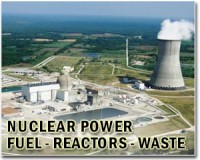 |
New Delhi (UPI) Mar 16, 2009 The Indian government withdrew the introduction of a bill that seeks to limit the liabilities of companies setting up nuclear power plants in the country. The bill would cap to about $65 million the compensation that foreign nuclear operators would be liable for in the event of a nuclear accident. The Indian government's liability, however, would be limited to about $385 million. All claims would be required to be presented within 10 years. The government maintains that without the legislation, foreign companies will be reluctant to invest in India's civil nuclear sector. But India's opposition parties say the bill was being pushed through because of U.S. pressure, that it does not protect Indian citizens in case of a nuclear disaster and that most of the burden for any cleanup falls on taxpayers. "It seems the government is going to bail out American companies from responsibility in case there is any nuclear accident," Shahnawaz Hussain, a legislator with India's main opposition Bharatiya Janata Party, said in a Bloomberg News report. U.S. and European energy firms have been eager to gain a foothold into India's nuclear energy market, which could exceed $150 billion in coming years, since a landmark 2008 deal between India and the United States that ended three decades of sanctions imposed on New Delhi for conducting nuclear tests. Last September, India announced it aims to boost its nuclear energy capacity by 12,000 percent by 2050. Already, during a visit to New Delhi last week, Russian Prime Minister Vladimir Putin signed agreements for Russia to build up to 16 reactors on three sites. Without a liability law in place, U.S. companies will not be able to obtain insurance coverage for their projects in India. But European competitors, such as Paris's Areva SA and Russia's Rosatom Corp., are covered by sovereign immunity because they are fully or partially state controlled. The liability issue is particularly significant to India, which experienced what is considered the world's worst industrial accident in 1984 when a cloud of toxic gas leaked from a Union Carbide pesticide factory in Bhopal, killing an estimated 10,000 people within three days. Indian Prime Minister Manmohan Singh reportedly wanted the bill passed in advance of his visit to Washington next month for a global nuclear security summit. Analysts said that Singh could now aim for its passage before U.S. President Barack Obama visits India, likely later this year. According to India's power ministry, the country's power demand outstripped supply by 9.5 per cent from 2008-09. More than 400 million Indians -- more than one-third of the population -- aren't connected to the national grid.
Share This Article With Planet Earth
Related Links Nuclear Power News - Nuclear Science, Nuclear Technology Powering The World in the 21st Century at Energy-Daily.com
 Germany to research nuke waste site
Germany to research nuke waste siteBerlin (UPI) Mar 15, 2009 The German government plans to end a 10-year moratorium by reopening research into a potential nuclear waste storage site, a decision that sparked immediate criticism from the opposition. German Environment Minister Norbert Roettgen said Berlin plans a security analysis of the controversial storage site at Gorleben in the state of Lower Saxony. The analysis and construction of a storage ... read more |
|
| The content herein, unless otherwise known to be public domain, are Copyright 1995-2010 - SpaceDaily. AFP and UPI Wire Stories are copyright Agence France-Presse and United Press International. ESA Portal Reports are copyright European Space Agency. All NASA sourced material is public domain. Additional copyrights may apply in whole or part to other bona fide parties. Advertising does not imply endorsement,agreement or approval of any opinions, statements or information provided by SpaceDaily on any Web page published or hosted by SpaceDaily. Privacy Statement |